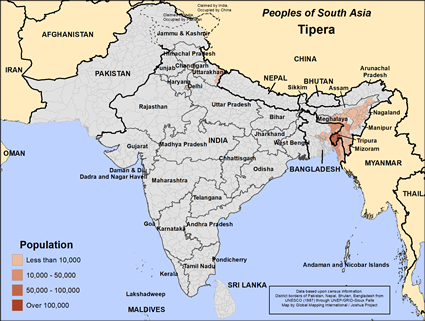Tipera in India

Photo Source:
Tirengma - Wikimedia
Creative Commons
|

Map Source:
People Group data: Omid. Map geography: UNESCO / GMI. Map Design: Joshua Project.
|
| People Name: | Tipera |
| Country: | India |
| 10/40 Window: | Yes |
| Population: | 694,000 |
| World Population: | 845,000 |
| Primary Language: | Kok Borok |
| Primary Religion: | Hinduism |
| Christian Adherents: | 8.51 % |
| Evangelicals: | 0.00 % |
| Scripture: | Complete Bible |
| Ministry Resources: | Yes |
| Jesus Film: | Yes |
| Audio Recordings: | Yes |
| People Cluster: | South Asia Tribal - other |
| Affinity Bloc: | South Asian Peoples |
| Progress Level: |
|
Introduction / History
The Tipera are primarily located in the Tripura Plains, which is located in the
state of Tripura, northeastern India. As their name suggests, they are Indigenous to this
area. Historical accounts suggest that they migrated from the upper courses of the Yangtze and Hwang Ho rivers in Western China. Over time, they moved through the Himalayas, eventually settling in Tripura. They are the largest tribe in Tripura state, and their land once extended over much of Bengal, Assam and northern Myanmar. The ruling family over this vast region belonged to the Tipera tribe, also called Tripura. The Tipera's language, Kok Borok, is a Baric language belonging to the Tibeto-Burman language family. The phrase, “kok borok” means “language people.” Kok Borok is the mother tongue of a majority of the tribes in Tripura, and it is the language used in primary schools. There are three main dialects of Kok Borok: Debbarma, Riang and Halam. The Bodo, who are ancestors of the Tipera, were once the most important Indo-Mongoloid people in all of eastern India. Even now, their descendants have special legal privileges.
What Are Their Lives Like?
In Tripura, many of the state services are reserved for scheduled tribe candidates. Today, due to the official state policy of favoring indigenous tribes in matters of social justice and economic affairs, the Tipera are favored for public services, education, land grants, and resettlement projects. The Tipera are primarily farmers. Traditionally, they lived as semi-nomads and used the slash-and-burn method of farming. However, in 1976, the government moved the Tipera to the plains and introduced them to settled cultivation. Those living in the plains grow jute, rice, wheat and sugarcane. Their biggest fear is the seasonal cyclones that flood the area and cause much damage to the crops and villages. Not all of the Tipera are farmers or farm laborers; some work in the state's industries. They include weaving cloth, milling rice and flour, canning fruit and producing bamboo and leather items. There are very few towns in the plains region. The Tipera generally live in small village settlements that are located near the river valleys. Their tiny, one-room houses are made of temporary materials such as mud or bamboo. A few houses have tin walls, and there is occasionally a home made of wood with a tile roof. Each village is divided into clans and castes and is run by a headman. The Tipera only marry within their tribe. Polygamy is permitted but rare. Young people are free to choose their marriage partners, although they must first receive permission from their parents. Promiscuity before marriage is freely tolerated among the Tipera, but accidental pregnancies lead to immediate marriage. Married couples usually do not have their own homes until they have had several children.
Tipera women are especially fond of wearing jewelry, which they buy from Bengali
craftsmen.
What Are Their Beliefs?
The Tipera practice religions that include worshiping the gods of fire, water and
the forest. The Tipera believe that the success of their harvests are reliant on these gods. They believe that they are surrounded by spirits affecting their welfare and health. They also believe that after death each man goes to the underworld and begins reliving his previous life. There are also some who have put their trust in Christ; such people can be used by God to disciple others.
What Are Their Needs?
A majority of the Tipera suffer from a poor state of health. In addition, they have no access to pure drinking water. The Tipera living in the plains have greater exposure to technology than those in the more remote regions. However, they also have more exposure to other religions; they are surrounded by Hindus, Buddhists and Tibetan Buddhists. This means that they are vulnerable to embrace other forms of spirituality, but it also means they have an opportunity to be Christ's ambassadors to these other religious groups.
Prayer Points
Pray for the Lord to give the Tipera people an abundant harvest as a testimony of his
goodness and power. Pray for the Lord to provide for their physical needs and that they may have good health. For workers and leaders to rise up in their communities. Pray for strong educational systems and family and community units that build one another up.